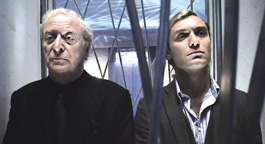home | metro silicon valley index | movies | current reviews | film review

Photograph by David Appleby
FOES: Michael Caine (left) and Jude Law really don't like each other in the remake of 'Sleuth.'
One-Upmanship
Kenneth Branagh updates, and downgrades, 'Sleuth,' even with Michael Caine for a second go-round
By Richard von Busack
THERE WERE two actors in the 1972 film Sleuth. One was Laurence Olivier, cozy in the idea that he was the greatest thespian of his generation. At the same time, he was an old man who turned 65 on the set of the film, with all the jealousy and insecurities that implies. Kenneth Geist's book on Sleuth's director, Joseph L. Mankiewicz, says that the other actor in the two-man picture, Michael Caine, described Olivier in the terms Churchill used to describe the Germans: "When he's not at your feet, he's at your throat." That quip sums up the games in Sleuth; two men either at each other's throats or feet, an alternation of gambits and blocked power plays. It's a story of one-upmanship: a wealthy old man called Andrew Wyke and a poor young man called Milo Tindle, both fighting over an off-stage woman in a remote English manor house. They use treachery and psychological tricks upon one another; and, at last, comes a pistol, honor bound by Chekhov's Law to go off by the third act.
The most noteworthy part in this remake by Kenneth Branagh is an unprecedented bit of stunt acting. Caine is now playing the wealthy snob Wyke, facing down that exemplar of Tony Blair's Britain, the polymorphously perverse Jude Law as the dodgy, unsuccessful and, worst of all, half-foreign actor who has seduced Wyke's wife. I mention the departed prime minister as one spot of evidence that the world is richer, queerer, more diverse and more treacherous than it was in 1972. England is more cosmopolitan, and the ruling class far less sure of itself. (And yesterday's Angry Young Man is today's Boring Old Crank.)
Branagh and Harold Pinter renovate the structure of Anthony Shaffer's original play/screenplay, sweeping out the carnival automatons and amusement-park games. They have replaced them with a slightly dated "futuristic"-looking concrete bunker full of surveillance gadgets and electronic remote-operated sliding panels. They have spruced up the structure, but they can't get the damp out of the walls. Naturally, Pinter's rewrite of Shaffer's play is more consciously profane. Pinter and Branagh try to Mamet things up; every use of the words "fuck" or "cunt" is supposed to make the roof tremble.
But in this version, it's harder to buy the premise. Is Caine's character nobility? In a sense, but he is no blue blood. A man who could afford a place like that would have to be a self-assured celebrity, instead of the doddering male Agatha Christie that Wyke was the first time around. Branagh brings out a small camera for purported intimacy. The under-the-chin shots of the actors reveal, rather than conceal, a once-delightful bit of second-act trumpery made possible by longer shots. (The audience of 1972 may have been shrewder in many respects, but loads of them were pranked by a character then called "Inspector Doppel.") Needing a fresher surprise in the end, Pinter's version takes a would-be flesh-creeping turn. It still feels a few decades too late, and it's not really more of a surprise than the ultimate re
![]() SLEUTH (R; 86 min.), directed by Kenneth Branagh; written by Harold Pinter, based on the play by Anthony Shaffer, photographed by Hans Zambarloukos and starring Michael Caine and Jude Law, opens Oct. 19 at Camera 12 in San Jose and CinéArts Santana Row.
SLEUTH (R; 86 min.), directed by Kenneth Branagh; written by Harold Pinter, based on the play by Anthony Shaffer, photographed by Hans Zambarloukos and starring Michael Caine and Jude Law, opens Oct. 19 at Camera 12 in San Jose and CinéArts Santana Row.
Send a letter to the editor about this story.
|
|
|
|
|
|